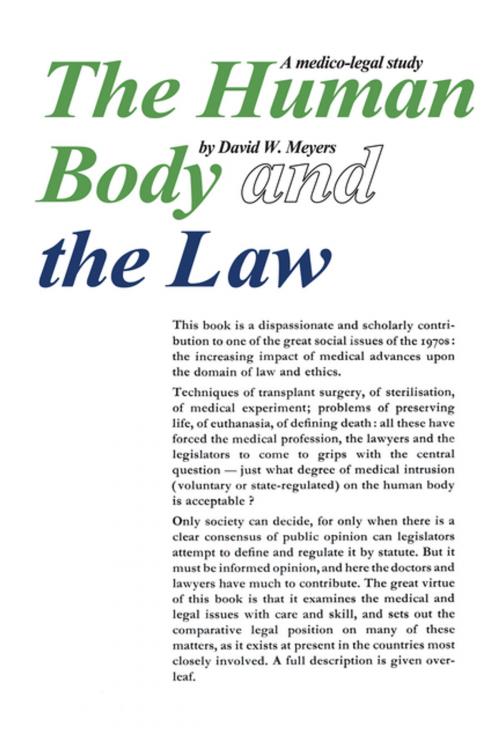Human Body and the Law
A Medico-legal Study
Nonfiction, Reference & Language, Law, Medical Law & Legislation, Social & Cultural Studies, Social Science, Sociology| Author: | Robert Maynard Hutchins | ISBN: | 9781351514569 |
| Publisher: | Taylor and Francis | Publication: | September 4, 2017 |
| Imprint: | Routledge | Language: | English |
| Author: | Robert Maynard Hutchins |
| ISBN: | 9781351514569 |
| Publisher: | Taylor and Francis |
| Publication: | September 4, 2017 |
| Imprint: | Routledge |
| Language: | English |
In this admirably objective and lucid exposition, the author examines from a medico-legal standpoint the comparative position in various countries, particularly in the UK and the USA, of currently controversial medical procedures: voluntary sterilisation, compulsory sterilisation and castration, trans-sexualism, experimentation, transplantation, and euthanasia - few of which, if any, enjoy a settled or clearly defined place in the eyes of the law. He considers the problems from two perspectives: first, that of the individual in society and how far he himself may determine the extent of physical intrusion on his body; secondly, that of the state or society and how far it may impose or limit medical intrusion on the human body. Thus, Mr. Meyers provides a valuable account, not only of current medical attitudes, but also of relevant case and statute law as it stands at present.It is inherent in the nature of this book that it should arouse controversy and argument. There are many important questions to be debated: Has the state the right to enforce its conception of morality without showing that the behaviour it proscribes has a harmful effect on other members of society? To what extent does consent by the individual concerned insulate a surgeon from criminal liability? In connection with compulsory sterilisation, who is to judge those unfit to procreate? What is a proper definition of medical experimentation? What constitutes death? If a man has a right to live has he not an equal right to die?These are a few of the issues raised. The author has not hesitated to express his own opinions but has clearly relegated them to the summary at the end of each chapter, thereby leaving the objectivity of his main text unimpaired.David W. Meyers is a practicing lawyer in California, with American and British legal qualifications at the firm of Dickenson, Peatman & Fogarty. He has taught at the University of Edinburgh Law School and the University of Tasmania Law School as well as
In this admirably objective and lucid exposition, the author examines from a medico-legal standpoint the comparative position in various countries, particularly in the UK and the USA, of currently controversial medical procedures: voluntary sterilisation, compulsory sterilisation and castration, trans-sexualism, experimentation, transplantation, and euthanasia - few of which, if any, enjoy a settled or clearly defined place in the eyes of the law. He considers the problems from two perspectives: first, that of the individual in society and how far he himself may determine the extent of physical intrusion on his body; secondly, that of the state or society and how far it may impose or limit medical intrusion on the human body. Thus, Mr. Meyers provides a valuable account, not only of current medical attitudes, but also of relevant case and statute law as it stands at present.It is inherent in the nature of this book that it should arouse controversy and argument. There are many important questions to be debated: Has the state the right to enforce its conception of morality without showing that the behaviour it proscribes has a harmful effect on other members of society? To what extent does consent by the individual concerned insulate a surgeon from criminal liability? In connection with compulsory sterilisation, who is to judge those unfit to procreate? What is a proper definition of medical experimentation? What constitutes death? If a man has a right to live has he not an equal right to die?These are a few of the issues raised. The author has not hesitated to express his own opinions but has clearly relegated them to the summary at the end of each chapter, thereby leaving the objectivity of his main text unimpaired.David W. Meyers is a practicing lawyer in California, with American and British legal qualifications at the firm of Dickenson, Peatman & Fogarty. He has taught at the University of Edinburgh Law School and the University of Tasmania Law School as well as















